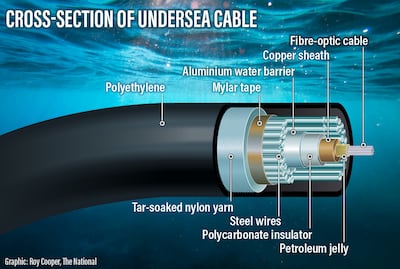Swedish authorities have seized a ship suspected of involvement in the sabotage of a fibre optic cable in the Baltic Sea, after Latvia reported disruptions in data transmission.
An investigation into aggravated sabotage began after the undersea cable connecting Latvia and the Swedish island of Gotland was damaged, Swedish prosecutors said.
“Several authorities, including the National Police Operations Department, the Coast Guard and the armed forces, are involved in the investigation,” said Mats Ljungqvist, senior prosecutor at the National Security Unit, in a statement.
It is the third such incident in the Baltic Sea in the past three months, with fears growing that Russia is conducting a campaign to sabotage undersea cables vital for communications, especially international banking transactions.
An oil tanker linked to Russia’s so-called shadow fleet – hundreds of tankers of uncertain ownership that evade sanctions and keep oil revenue flowing into the country – was suspected of damaging undersea cables with a loose anchor in December. A month earlier, a Chinese ship was suspected of a similar incident.
The Swedish Coast Guard told the Expressen newspaper that the latest incident involved the Malta-flagged Vezhen, at anchor near the southern Swedish port of Karlskrona.
“We are directly on site with the seized ship and are taking measures as decided by the prosecutor,” said Coast Guard spokesman Mattias Lindholm.

The vessel departed the Russian port of Ust-Luga several days earlier and was sailing between Gotland and Latvia, data from Vesselfinder shows. Latvia's state-run radio and TV centre said on Sunday that it concluded the cable, which runs between the town of Ventspils to Gotland, after data transmission was disrupted.
The media organisation said it was able to operate using other data transmission routes, while repairs were carried out.
“At the moment, there is reason to believe that the cable is significantly damaged and that the damage is caused by external influences,” Vineta Sprugaine, head of corporate communications at LVRTC, was quoted as saying by the LSM state broadcaster.
Latvian Prime Minister Evika Silina said on X that her government was “working together with our Swedish allies and Nato on investigating the incident, including patrolling the area, as well as inspecting the vessels that were in the area".
Swedish Prime Minister Ulf Kristersson wrote on X that at least one cable belonging to a “Latvian entity” was believed to have been damaged and that he was “in close contact” with Ms Silina.

Nato this month began its Baltic Sentry mission, which involves frigates, maritime patrol aircraft and naval drones, to provide “enhanced surveillance and deterrence” in the Baltic Sea. Nato says it aims is to protect undersea cables and pipelines.
It is using the Nordic Warden advanced AI-assisted computer system, which alerts Nato when it detects a potential threat.
A Russian spy ship was escorted out of British waters last week after a Royal Navy nuclear hunter-killer submarine was ordered to surface next to it to demonstrate it had been monitored.
In a message intended for Russian President Vladimir Putin, UK Defence Secretary John Healey said: “We see you. We know what you're doing and we will not shy away from robust action to protect this country.”


